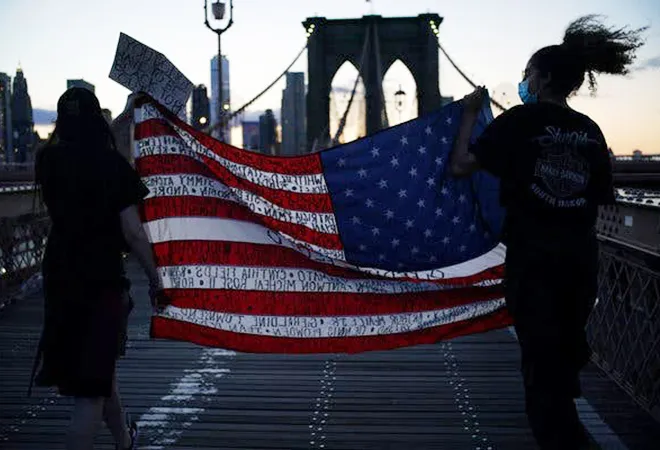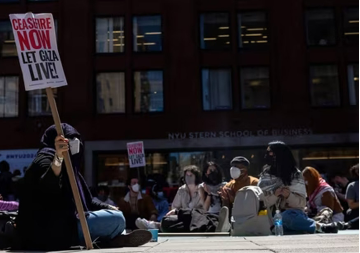
Last month, George Floyd's death came as the latest in a line of killings of African Americans by American law enforcement officers. Reported to have died of asphyxia, Floyd was seen groaning for help (“please, I can't breathe”) in a widely circulated video. In which, Derek Chauvin, a white police officer, was seen kneeling on Floyd’s neck for nearly nine minutes. In sparking nation-wide protests, this incident has reawakened African Americans’ anger against police brutality and rekindled their long-standing struggle for racial justice in the US.
With respect to the 2020 election, this incident closely followed the presumptive Democratic nominee and former Vice President Joe Biden’s gaffe over his party’s presumed hold over the African American community. In an interview, Biden said: "If you have a problem figuring out whether you’re for me or Trump, then you ain’t black." For President Donald Trump, the incident comes at a time when he has been seeking to pivot the conversation away from his lax federal response to the coronavirus pandemic — which disproportionately affected African Americans with deaths nearly “two times greater than would be expected based on their share of the population.” Moreover, Floyd’s death and the unrest thereafter is set to impact the election in the following ways:
Inefficacy of ‘Black faces in high places’
With the incident, support for the consolatory approach of fighting racial injustice with gradual induction of African Americans in positions of authority is coming under strain. In an interview, civil rights activist Cornel West declared "black faces in high places" to have failed in translating into change because individuals often succumb to the "capitalist economy" and "militarized nation-state.” He continued: "The Black Lives Matter movement emerged under a black president , black attorney general , and black homeland security and they couldn't deliver.”
Impatience with this approach is set to upend Biden’s shortlist for a running-mate. After committing to have a woman on the ticket, there have been calls for Biden to go for a woman of colour. In recognising the centrality of black women voters in the 2018 midterms which propelled Democrats to flip control of the US House of Representatives, that prescription also seeks to correct the “abysmal turnout among registered black voters in Michigan, Wisconsin and Pennsylvania in 2016.” However, with the reinvigoration of conversations around systemic racial injustice, two African American vice-presidential hopefuls — Sen. Kamala Harris (D-CA) and Rep. Val Demings (D-FL-10), now find their records under renewed scrutiny.
Sen. Harris’ record as a California district attorney and later as the state’s attorney general has invited controversy. Chiefly, over her support for a “state legislation under which parents whose children were found to be habitually truant in elementary school could be prosecuted, despite concerns that it would disproportionately affect low-income people of color.” Similarly, Rep. Demings, who served as Orlando’s first woman police chief has often been criticised of doing little to change the Orlando Police Department, which reportedly paid nearly US$ 3.3 million in damages towards 47 lawsuits over false arrests, excessive force and other complaints between 2010-14.
Law-and-Order over ‘Blue Lives Matter’
In the years following the Black Lives Matter movement — which espoused progressives’ push against institutionalised racism, conservatives rallied around a corollary movement. Blue Lives Matter sought to limit officers’ responsibility on assimilating communities due to credible threats to their own well-being.
The conservative coalition around law enforcement groups emerged as a key voter base for Trump, evidenced in chants of ‘Blue Lives Matter’ at the Republican National Convention in 2016. Unions representing Border Patrol agents and Immigration and Customs Enforcement officers even made their first presidential endorsements in favor of Trump. Once in office, he has overseen a decrease in the Justice Department’s oversight of law enforcement, in contrast to Barack Obama’s support for civil rights inquiries into the Ferguson and Baltimore police departments. Trump’s support for the Blues, has also fed conservatives’ call for designating violence against officers as a federal hate crime, opposing Obama-era policy of curtailing federal transfer of “surplus military equipment to local police departments”. It also heightened invocation of conservative theories like the “Ferguson effect” — which purports that protests in response to police actions empower criminals and demotivate local forces.
However, with Floyd’s death being captured in a graphic video (without an apparent threat to the kneeling officer), conservatives are hedging bets on their usual ‘Blue Lives Matter’ clarion. Instead, they have opted to retort with the illegality of the protests that have followed. Conservative pundits and the president himself have referred to protestors as “Criminal Mobs”, “Thugs”, and “radical rioters exploiting this death of Mr. Floyd, committing crimes, justifying crimes, threatening more violence.” Trump has even sought to construe himself as "your president of law and order” by calling protests "domestic acts of terror” and vowing to use the military to quell the unrest.
In construing the protests as a law-and-order matter, Democrats have thus found themselves in a quandary, balancing support of their most loyal voter base with refraining from coming across as condoning the disruption of law-and-order.
Minneapolis in national politics
With the epicentre of protests in Minneapolis, the local politics of Minnesota which is already a crucial Rust Belt swing-state, is set to come under national spotlight. For starters, Minnesota Senator Amy Klobuchar may “end up as the first political casualty of the Minneapolis unrest.”
Over her eight-year tenure as the chief prosecutor in Minneapolis, Klobuchar was known to have pursued policies that “shored up her support in white suburbs at the cost of unfairly targeting minorities and declining to prosecute police shootings.” Klobuchar’s record has now come under renewed scrutiny due to her history with Chauvin, the officer who knelt on Floyd’s neck. During the last year of Klobuchar’s tenure, Chauvin was involved in a police-related shooting for which he and five other officers had no charges levied against them. Although she had left office by the time his case reached a grand jury, critics have purported a “direct line of culpability between Klobuchar and this officer who lynched a man” and some have even called for her resignation.
Amidst Democrats mounting an offensive to gain control of the Republican-held Senate in the 2020 election, Klobuchar’s declining fortunes could complicate their position in the already tight 53 Republicans - 45 Democrats + 2 independents profile of the US Senate. Further, the Minneapolis unrest will only compound the politics over Minnesota’s urban-rural divide. Its credential as a swing-state stems from the tussle between “the liberal Twin Cities and a sea of red in much of the surrounding farmland”. In 2016, Hillary Clinton won Minnesota by less than 2 percentage points (under 45,000 votes) at the hands of the “population-rich Minneapolis-St. Paul area.” Stoking that urban-rural divide in an attempt to appeal to those that have frowned at the protests upending law-and-order, Trump has blamed the city’s Democratic leaders. He tweeted, “A total lack of leadership. Either the very weak Radical Left Mayor, Jacob Frey, get his act together and bring the City under control, or I will send in the National Guard & get the job done right”.
Hence, from rising impatience with the ‘Black faces in high places’ approach to dampening conservatives’ ‘Blue Lives Matter’ clarion, George Floyd’s death presents diverse ramifications for the election.
The views expressed above belong to the author(s). ORF research and analyses now available on Telegram! Click here to access our curated content — blogs, longforms and interviews.




 PREV
PREV


